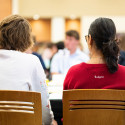Go Big Read makes promising start in first year
It’s just a few months old, but Go Big Read, UW–Madison’s new common-reading program has delivered some impressive numbers.
The book, “In Defense of Food,” by Michael Pollan, was used in 63 unique courses (that number explodes to 131 when multiple sections are computed); 8,628 copies of the book were distributed; some 8,000 people from campus and the community attended Pollan’s lecture at the Kohl Center in September; 65 volunteer book discussion facilitators were recruited and trained; and 17 book discussions have been held on campus and in the community, facilitated by the volunteer leaders.
In addition, groups around the state and UW–Madison alumni from New York to Paris also held book discussions. Some of those groups watched Pollan’s lecture as it was streamed online. Those unable to attend a discussion have participated virtually by posting to and reading a blog on the Go Big Read Web site. Media coverage of the program and Pollan’s lecture reached across Dane County, the state and the country.
But what of those 131 classes that used the book for teaching and student learning? A key component of Go Big Read is integrating the book into course content. The book was required reading for some courses; in others, themes and issues raised in the book sparked discussions, papers and presentations. Every student enrolled in a course using the book received a free copy of “In Defense of Food.”
Cathy Middlecamp, distinguished faculty associate with a joint appointment in the Department of Chemistry and Integrated Liberal Studies Program, used the book in her course, Chemistry 108, Chemistry in Context. The class engages students with real-world issues that connect to chemistry, such as global climate change, air quality, and energy and food production.
At the beginning of the semester, Middlecamp said she planned on using the book to explore topics relating to growing and eating corn — its chemical composition and nutritional value, of course — but also associated topics such as corn’s impact on the environment and the use of high fructose corn syrup in many processed foods. Her goal was to have her students learn chemistry along with seeing how chemistry applies to complex issues that don’t have simple answers.
She just wrote and gave that lecture on high fructose corn syrup. “It has been terrific working with Michael Pollan’s book. I’d like students to learn more about sugars in foods and beverages every year, even if we’re not reading ‘In Defense of Food,’” says Middlecamp.
Irwin Goldman, interim dean of the College of Agricultural and Life Sciences (CALS), has used Pollan’s books in his classes before Go Big Read. “I’ve always found his ideas are great for education and great for discussion. The level of interest in the classroom is very high and has generated some excellent class discussion,” Goldman writes to the Go Big Read Steering Committee.
Go Big Read is not over; it continues throughout the academic year, and “In Defense of Food” will be used in classes during the spring semester, although a more modest two dozen or so faculty have currently committed to using the book.
Students, faculty and staff who used the book in the fall semester and no longer want their copy, may donate them to be redistributed to students for classroom use or for another community educational purpose if a surplus is returned. The books can be returned to any campus library or in a library drop slot.
A highlight of the Go Big Read program during the spring semester will be a forum on food on April 23 at the Memorial Union as part of the alumni weekend day-on-campus program. Organized by the Wisconsin Alumni Association and CALS, the program will feature a day of food-related panels and discussion on a variety of topics by UW–Madison faculty and staff, such as research, health, economics, safety, history, law, food culture, urban agriculture, environmental impacts of food production and discoveries from UW–Madison that have changed the food landscape.
Specifics on the forum are taking shape, but confirmed topics include global obesity and diabetes issues; the international economics of food; food safety and food safety research; urban agriculture; Renaissance cooking; and antitrust laws and agriculture. More topics will be added, reflecting the cross-disciplinary approach of the program.
George McGovern, former United States representative, senator and presidential nominee, will be the keynote speaker. McGovern served as the director of the Food for Peace Program and chaired the U.S. Senate Select Committee on Unmet Basic Needs. Day-on-campus events are free and open to the public.
Plans are also under way for next year’s Go Big Read. The Go Big Read Steering Committee will soon submit a list of finalists to the chancellor, who will make the final decision early next semester. The book selected will determine many of the associated events and activities, but regardless of the book, the steering committee anticipates campus and community engagement, curricular use and a public event that will bring people together to share ideas.




